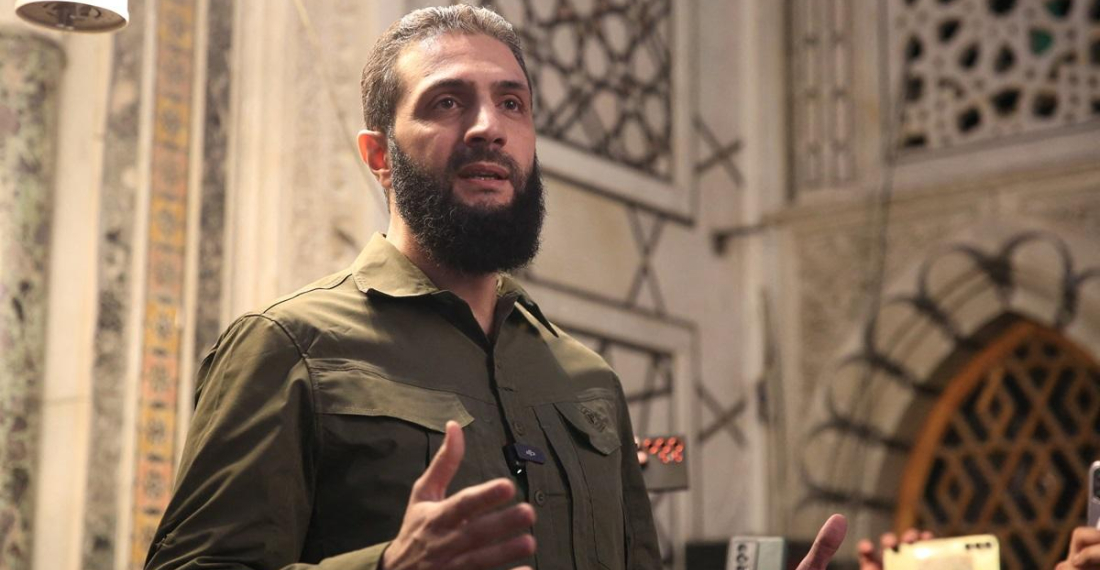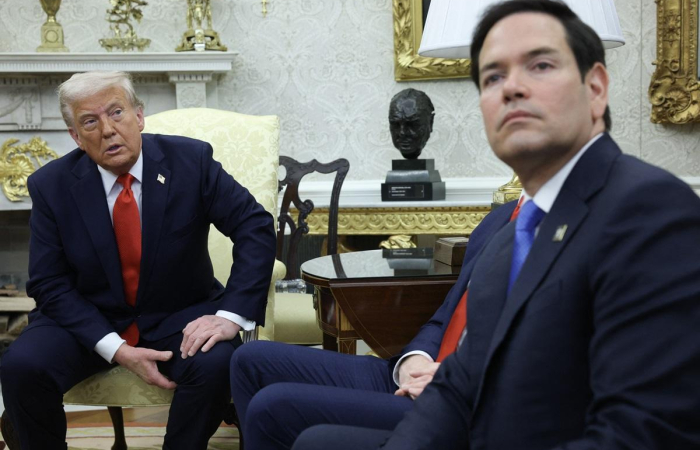The new Syrian leader, Ahmed al-Sharaa, made an important appearance on the world stage in the last days, visiting Türkiye and the United Arab Emirates. This was not al Sharaa’s first international outing since overthrowing the Baathist regime, led by Bashir al-Assad, in December. In February he visited Saudi Arabia and made short stops in Türkiye and Egypt. But this time round the visits appeared better prepared. In Türkiye, al Sharaa participated in the Antalya Diplomacy Forum where he met some of the world leaders and delegations present. He also met with Turkiye’s President, Recip Tayib Erdogan. From Antalya, al-Sharaa flew to Abu Dhabi for meetings with the UAE President, Sheikh Mohammed bin Zayed, and other Emirati officials.
On Thursday al-Sharaa visited Qatar, where the ruler, Sheikh Tamim bin Hamad al Thani, facilitated a meeting between al-Sharaa and the prime minister of Iraq, Moammed Shia al Sudani. The feud between the two former Baathist regimes in the Middle East, Iraq and Syria, had lasted for decades, and remained complex even after the collapse of these regimes. The meeting in Doha opened the way for the participation of the Syrian leader at the next Arab Summit, due to be held in Baghdad on May 17th.
The influential Jerusalem Post wrote on Wednesday (14 April) that the trips “highlight al-Sharaa’s clout, and ability to navigate the complex politics of the Middle East”. The newspaper further wrote that al-Sharaa “wants to ensure that he is not perceived as a proxy, or as being controlled by any one country”.
Türkiye has made it clear that it considers Syria as “its business”. It is nominally committed to a united Syria, but Turkish action will be guided by what it considers to be expedient. Türkiye still controls big chunks of Syrian territory, and is determined not to allow a Kurdish autonomy in Syria.
There are many questions regarding the post-Erdogan era, both if he is replaced by someone else from the AK party, or the opposition. The arrest of Istanbul Mayor and main opposition presidential candidate, Ekrem Imamoglu, has triggered large protests in Türkiye. But whatever happens next domestically, sudden changes in Türkiye’s Syria policy are unlikely.
Certainly, Türkiye has become significantly more important in Syrian affairs since the latter’s change of government in December. The Head of Turkish Intelligence is a regular visitor to Damascus, and in Antalya Erdogan singled out al-Sharaa for particular praise for his support of Turkish action against Syrian Kurdish Groups that Ankara considers as terrorists. Erdogan was vocal in his support for a united and multi-ethnic and multi-confessional Syria.
But the ruling group in Damascus is diverse, and more rooted in Islamist forces. Al-Sharaa has to finely balance his grass roots with the reality of managing a complex country. The recent massacres of Alawites is a case in point. It could not have happened without some support from the new regime, but it tempered al-Sharaa’s efforts to project his rule as one for all Syrians.
On his return to Damascus from his trip to Türkiye and UAE al-Sharaa unveiled a new transitional 23-member cabinet. The Cabinet includes some of al-Sharaa’s closest supporters and others aligned with him. Most are Sunni Muslims, reflecting the country’s confessional composition.
A breakdown of the population before the civil war indicated that the population consisted of Arab-Sunni (62%); Arab-Alawite (13%); Kurd-Sunni (10%); Greek Orthodox Christian (8%); Armenian-Christian (2%); Arab-Druze (2%); Arab-Ismaeli (2%) and Turkmen, Circassian & Assyrian (1%). Even though these figures should be considered as indicative rather than factual, they nonetheless show the country’s diversity. The Baathist regime was strongly embedded in the Alawite community, which made this community particularly vulnerable.
Millions of Syrians were displaced by the civil war which raged in the country since 2010. They found abode in a large number to foreign countries, including neighbours, Türkiye, Lebanon, Iraq and Jordan and in European countries such as Germany, Greece and Sweden. Some five million were registered as refugees by the UNHCR as of mid-2019. Some will return.
Managing this mix will be one of al-Sharaa’s biggest headaches. In his speech to launch the new government made to a gathering at the Presidential Palace after prayers to mark the Muslim holiday of “Eid al Fitr”, al-Sharaa said that the new Cabinet would aim for consensus, but acknowledged that his government “will not be able to satisfy everyone”.
Apart from Türkiye, the other country that makes Syria its business is Israel. Israel has since 1967 pursued a policy of containing Syria, particularly through regular and targeted military action. In the last months, it has shown that it intends to continue doing so. Israel has launched hundreds of strikes against military sites in Syria since December. The policy of pressure is likely to continue, and Israel may in the future support groups inside Syria opposing al-Sharaa, or may be doing so already. Israel has no wish to see a united strong Syria and is very wary of Turkish influence in the country.
Israel’s attempts to use Syria’s ethnic and confessional divide to weaken the country were strongly condemned by Turkish President Erdogan. “Israel is trying to dynamite the December 8 revolution by stirring up ethnic and religious affiliations, and turning minorities in Syria against the government”, he told the Antalya forum. Erdogan pledged support for the Syrian government. Syria is already a battleground for Turkish-Israel rivalry, and is likely to be more so in the future.
Türkiye and Israel are holding “technical talks” aimed primarily at avoiding unintended military incidents that may result in serious escalation. The first round was held in Baku, Azerbaijan two weeks ago. Türkiye moved swiftly to downplay the significance of the talks. Foreign Minister Hakan Fidan said that the meeting did not mean that the two sides were normalising ties, strained by Israel’s handling of Gaza.
The role of Russia, the US and the EU is changing. Russia was a loser in the regime change that toppled Assad The new regime may still find a common language with Russia but it will be a different kind of relationship.
Donald Trump does not see any value in maintaining a US presence in Syria. However, he has been persuaded not to leave abruptly. There are currently 2000 US soldiers in Syria, This number will shortly decrease to 1400, according to reports in the American media. The same reports say that the situation will be assessed in a few month's time, and that the preference is to leave 500 US soldiers in Syria after that. Another decision that has been postponed is related to sanctions. The US State Department said in March that it was too early to lift sanctions. Al-Sharaa is keen to have sanctions lifted as soon as possible, but the issue is likely to be caught in another wave of “Trumpian bargaining” that these days has become the cornerstone of US foreign policy.
For the European Union, Syria is no longer just a refugee problem. Many issues such as its proximity, and the large Christian minority, mean that the EU, as it increases its geo-political role, will get increasingly involved in Syria. Member states such as France, Italy and Greece will push for that. Italy, for example, just announced a multi-million euro aid program for Syria. First EU engagement will be humanitarian support, but in the case of Syria this is just the start, and a more holistic approach is necessary
Syria is a long way from peace and stability. But al-Sharaa’s efforts to bring it back to the world stage is commendable. The world must engage with Syria in a multi-faceted way. The next decade will be crucial for the Syrian people, for Syria, and in the end, for peace and stability in the Middle East.
Please click here to download this week's Monday Commentary.






